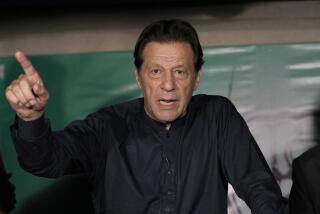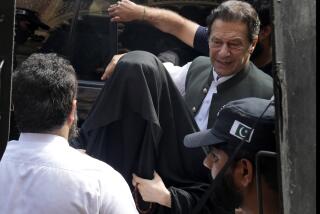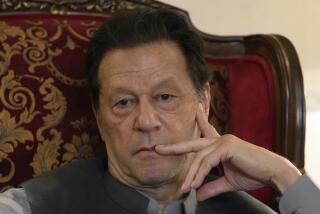Musharraf suffers another setback
- Share via
ISLAMABAD, PAKISTAN — Adding to already intense political pressure on President Pervez Musharraf, Pakistan’s high court on Friday ordered the release of an important opposition figure who had been jailed on charges of inciting mutiny.
The decision to free Javed Hashmi, imprisoned since 2004, marked the latest setback for Musharraf, who is struggling to retain his positions both as army chief and head of state.
The three-judge panel that made the ruling was chaired by Chief Justice Iftikhar Mohammed Chaudhry, who recently emerged victorious from a months-long showdown with Musharraf.
The Pakistani leader had suspended Chaudhry in March, citing alleged misconduct. But critics said Musharraf feared that the independent-minded judge would be an impediment to his plans to have the parliament and provincial assemblies approve him for another five-year term as president before legislative elections in January.
The Supreme Court last month reinstated Chaudhry and ordered all charges dropped. The suspension had generated enormous protests that coalesced into a pro-democracy movement against Musharraf, an army general who seized power in a 1999 coup.
Friday’s decision was also seen as a slap at the powerful Pakistani military, which for years has been able to intimidate most critics into silence. Hashmi had been convicted in a closed trial of trying to incite an army rebellion by circulating a letter, purportedly by Pakistani military officers, that was critical of Musharraf’s alliance with President Bush. The government said the document was a forgery.
The high court will review Hashmi’s case, and ordered him freed in the meantime.
In coming months, Musharraf’s political rivals are expected to make greater use of legal channels, particularly the reenergized Supreme Court. During most of his eight-year rule, the courts have bent to his wishes.
Exiled former Prime Minister Nawaz Sharif, who was toppled by Musharraf, has asked the high court to allow him to return to Pakistan to run in the parliamentary elections.
Another exiled former prime minister, Benazir Bhutto, has also signaled her desire to return to Pakistan, whether or not she is able to strike a power-sharing deal with Musharraf that would result in corruption charges against her being dropped. She and Musharraf held talks last week in the Persian Gulf emirate of Abu Dhabi, but no accord was announced.
Bhutto has demanded that Musharraf give up his army role if he wants to remain in politics.
Amid the tumult, the Pakistani leader is facing an upsurge of violence by Islamic militants furious over last month’s military storming of a mosque controlled by radicals in the capital, Islamabad.
Militants based in Pakistan’s rugged tribal lands on the Afghan border have been mounting near-daily attacks on Pakistani troops. A military convoy was ambushed Friday, but troops managed to fight off the attackers, killing four of them.
Musharraf has come under strong criticism, most recently in a major U.S. intelligence report, for allegedly not doing enough to prevent militants from using the tribal areas as a sanctuary.
Pakistan says it is doing all it can to fight Al Qaeda and Taliban elements, but insists that the main problem lies across the border in Afghanistan.
The Pakistani government has reacted angrily to comments from within the Bush administration, and by Democratic presidential contender Barack Obama, suggesting that the U.S. should stage strikes in the tribal areas if Pakistan does not act to contain the militants.
More to Read
Sign up for Essential California
The most important California stories and recommendations in your inbox every morning.
You may occasionally receive promotional content from the Los Angeles Times.













